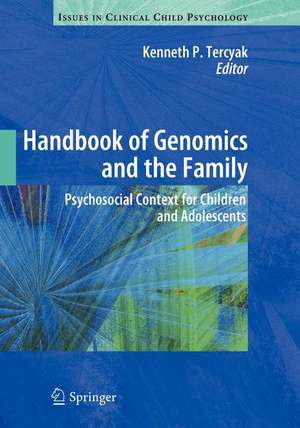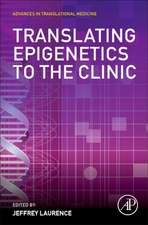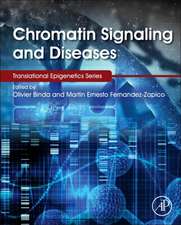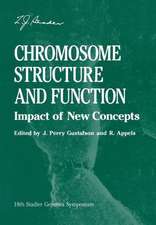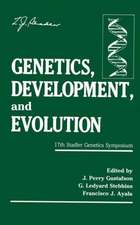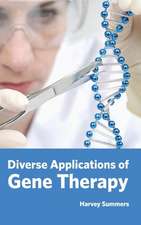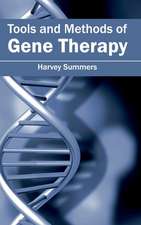Handbook of Genomics and the Family: Psychosocial Context for Children and Adolescents: Issues in Clinical Child Psychology
Editat de Kenneth P. Tercyaken Limba Engleză Paperback – 26 dec 2011
| Toate formatele și edițiile | Preț | Express |
|---|---|---|
| Paperback (1) | 1941.84 lei 6-8 săpt. | |
| Springer Us – 26 dec 2011 | 1941.84 lei 6-8 săpt. | |
| Hardback (1) | 2897.28 lei 6-8 săpt. | |
| Springer Us – 11 iun 2010 | 2897.28 lei 6-8 săpt. |
Din seria Issues in Clinical Child Psychology
- 5%
 Preț: 1346.30 lei
Preț: 1346.30 lei - 5%
 Preț: 372.03 lei
Preț: 372.03 lei - 18%
 Preț: 722.58 lei
Preț: 722.58 lei - 18%
 Preț: 2116.32 lei
Preț: 2116.32 lei - 5%
 Preț: 2144.78 lei
Preț: 2144.78 lei - 5%
 Preț: 1318.81 lei
Preț: 1318.81 lei - 18%
 Preț: 1662.70 lei
Preț: 1662.70 lei - 5%
 Preț: 1444.63 lei
Preț: 1444.63 lei - 18%
 Preț: 1831.42 lei
Preț: 1831.42 lei - 5%
 Preț: 1131.72 lei
Preț: 1131.72 lei - 15%
 Preț: 645.79 lei
Preț: 645.79 lei - 5%
 Preț: 1437.86 lei
Preț: 1437.86 lei - 18%
 Preț: 1835.21 lei
Preț: 1835.21 lei - 18%
 Preț: 2105.58 lei
Preț: 2105.58 lei - 18%
 Preț: 1824.95 lei
Preț: 1824.95 lei - 5%
 Preț: 1343.50 lei
Preț: 1343.50 lei - 18%
 Preț: 1003.52 lei
Preț: 1003.52 lei - 5%
 Preț: 721.19 lei
Preț: 721.19 lei - 5%
 Preț: 1429.44 lei
Preț: 1429.44 lei - 5%
 Preț: 719.59 lei
Preț: 719.59 lei - 15%
 Preț: 647.27 lei
Preț: 647.27 lei - 18%
 Preț: 1234.14 lei
Preț: 1234.14 lei - 18%
 Preț: 1842.16 lei
Preț: 1842.16 lei - 18%
 Preț: 949.42 lei
Preț: 949.42 lei - 5%
 Preț: 1130.43 lei
Preț: 1130.43 lei - 15%
 Preț: 591.29 lei
Preț: 591.29 lei - 18%
 Preț: 1126.52 lei
Preț: 1126.52 lei - 18%
 Preț: 950.52 lei
Preț: 950.52 lei - 18%
 Preț: 1245.84 lei
Preț: 1245.84 lei
Preț: 1941.84 lei
Preț vechi: 2044.05 lei
-5% Nou
Puncte Express: 2913
Preț estimativ în valută:
371.69€ • 403.87$ • 312.42£
371.69€ • 403.87$ • 312.42£
Carte tipărită la comandă
Livrare economică 21 aprilie-05 mai
Preluare comenzi: 021 569.72.76
Specificații
ISBN-13: 9781461423959
ISBN-10: 1461423953
Pagini: 644
Ilustrații: XXVII, 615 p. 14 illus.
Dimensiuni: 178 x 254 x 46 mm
Greutate: 1.1 kg
Ediția:2010
Editura: Springer Us
Colecția Springer
Seria Issues in Clinical Child Psychology
Locul publicării:New York, NY, United States
ISBN-10: 1461423953
Pagini: 644
Ilustrații: XXVII, 615 p. 14 illus.
Dimensiuni: 178 x 254 x 46 mm
Greutate: 1.1 kg
Ediția:2010
Editura: Springer Us
Colecția Springer
Seria Issues in Clinical Child Psychology
Locul publicării:New York, NY, United States
Public țintă
Professional/practitionerCuprins
to Genomics.- Key Concepts in Human Genomics and Epidemiology.- Psychological Genetics: Understanding the Nature of Psychological Differences Through Etiology.- Cross-Cutting Issues in Children and Families.- Understanding Gene, Environment, and Gene × Environment Interaction Effects: The Example of Childhood Externalizing Disorders.- Process in Genetic Counseling: Considerations for Children and Their Families.- Genomics and the Family: Integrative Frameworks.- Potential Impact of Genomic Information on Childhood Sibling Relationships.- Family Communication of Genomic Information.- Conveying Genetic Risk to Teenagers.- Genes, Behavior, and Health.- Prenatal Screening and Diagnosis.- Single Gene Disease Risk.- Hereditary Cancer Risk.- Type 1 Diabetes Risk.- Cardiovascular Disease Risk.- Obesity Risk.- Tobacco and Alcohol Use Behaviors.- Childhood Neuropsychiatric Risk.- Genomic Risk Information for Common Health Conditions: Maximizing Kinship-Based Health Promotion.- Emerging Issues.- Pediatric Pharmacogenomics.- Informed Consent and the Protection of Human Subjects in Genomic Research with Children and Families.- Ethical, Legal and Social Issues in the Genetic Testing of Minors.- Guidelines and Policies on Genetic Testing in Children and Families.- Training, Practice, and Collaboration: New Opportunities for Pediatric Psychology and Genomic Medicine.- Public Health Genomics.
Recenzii
From the reviews:
“This book not only aims to provide a review of the state of the science, but also to explore the larger psychosocial and ethical issues inherent on this new frontier. It is appropriate for clinical and health psychologists, psychiatrists, genetic counselors, and others interested in the field. … This is a comprehensive book on a difficult, but important topic. … The integration of the genetic and disease models with psychosocial challenges is a particularly strong point for the book.” (Christopher J. Graver, Doody’s Review Service, January, 2011)
“This book not only aims to provide a review of the state of the science, but also to explore the larger psychosocial and ethical issues inherent on this new frontier. It is appropriate for clinical and health psychologists, psychiatrists, genetic counselors, and others interested in the field. … This is a comprehensive book on a difficult, but important topic. … The integration of the genetic and disease models with psychosocial challenges is a particularly strong point for the book.” (Christopher J. Graver, Doody’s Review Service, January, 2011)
Notă biografică
Kenneth P. Tercyak, PhD is an associate professor in the Division of Health Outcomes and Health Behaviors of the Department of Oncology and in Pediatrics at the Georgetown University Medical Center in Washington, DC. He received his bachelor of arts degree in psychology from the University of Pennsylvania, and doctor of philosophy in clinical psychology from the University of Florida’s College of Public Health and Health Professions.
Dr. Tercyak’s research has focused on cancer prevention and control among children, adolescents, and families. This includes investigations of the social and behavioral aspects of genetic testing for hereditary cancer syndromes among parents, developing and testing strategies for informed decision making and communication support in cancer genetics, and evaluating long-term outcomes among children growing-up in environments affected by familial cancer. Dr. Tercyak’s other investigations have included a focus on biopsychosocial influences on youth smoking adoption, pediatric cancer survivorship, adolescent health promotion, and predictive testing for common disease risk. He has received continuous funding by the National Institutes of Health since 1998, including a National Research Service Award and Research Career Development Award from the National Cancer Institute, and funding from the National Human Genome Research Institute’s Ethical, Legal, and Social Implications research program and the Division of Cancer Control and Population Sciences at the National Cancer Institute.
Dr. Tercyak’s scholarly contributions consist of more than 75 journal articles and book chapters. He has delivered invited presentations at a number of scientific organizations, including the American Society of Human Genetics, the Dana-Farber Cancer Institute, and St. Jude Children's Research Hospital.
Dr. Tercyak is a Full Member of the Division of Population Sciences and the Jess and Mildred Fisher Center for FamilialCancer Research at the Lombardi Comprehensive Cancer Center at Georgetown. He is also a member of the Behavioral Medicine Study Section of the National Institutes of Health, and former member of the psychosocial peer review committees of the American Cancer Society and Susan G. Komen for the Cure Foundation; he has served as a grant reviewer for other National Institutes of Health study sections and special emphasis panels and international research organizations as well. Dr. Tercyak is a reviewer for a number of professional journals. Currently, he is serving a term as Associate Editor for prevention science at the Journal of Pediatric Psychology and is a member of the incoming editorial board at Health Psychology.
Dr. Tercyak’s research has focused on cancer prevention and control among children, adolescents, and families. This includes investigations of the social and behavioral aspects of genetic testing for hereditary cancer syndromes among parents, developing and testing strategies for informed decision making and communication support in cancer genetics, and evaluating long-term outcomes among children growing-up in environments affected by familial cancer. Dr. Tercyak’s other investigations have included a focus on biopsychosocial influences on youth smoking adoption, pediatric cancer survivorship, adolescent health promotion, and predictive testing for common disease risk. He has received continuous funding by the National Institutes of Health since 1998, including a National Research Service Award and Research Career Development Award from the National Cancer Institute, and funding from the National Human Genome Research Institute’s Ethical, Legal, and Social Implications research program and the Division of Cancer Control and Population Sciences at the National Cancer Institute.
Dr. Tercyak’s scholarly contributions consist of more than 75 journal articles and book chapters. He has delivered invited presentations at a number of scientific organizations, including the American Society of Human Genetics, the Dana-Farber Cancer Institute, and St. Jude Children's Research Hospital.
Dr. Tercyak is a Full Member of the Division of Population Sciences and the Jess and Mildred Fisher Center for FamilialCancer Research at the Lombardi Comprehensive Cancer Center at Georgetown. He is also a member of the Behavioral Medicine Study Section of the National Institutes of Health, and former member of the psychosocial peer review committees of the American Cancer Society and Susan G. Komen for the Cure Foundation; he has served as a grant reviewer for other National Institutes of Health study sections and special emphasis panels and international research organizations as well. Dr. Tercyak is a reviewer for a number of professional journals. Currently, he is serving a term as Associate Editor for prevention science at the Journal of Pediatric Psychology and is a member of the incoming editorial board at Health Psychology.
Textul de pe ultima copertă
Today’s consumer can send a company a DNA sample and receive a detailed set of genetic test results in return all without ever visiting a health care provider. Although knowing one’s personal risk for serious disease may lead some individuals to make more informed health choices, an ever-growing set of questions remains: Are predictive genetic tests meaningful? Can the results be harmful as well as helpful? In what ways can genetic information be used by health care providers to predict disease risk and optimize medical management within concerned families? Most important, how might the landscape of genetic testing affect the care of children’s health?
Although there are no easy answers, the Handbook of Genomics and the Family details in one authoritative volume the challenges entailed by the latest genetic advances and offers insights into the potential translation of this knowledge in pediatric and family practice and public health. This timely and comprehensive reference introduces readers to the study of how genes, singly and in combination with each other and the environment, affect health and behavior; summarizes current findings on genetics and genomics in disease etiology and prevention; and provides family-focused perspectives relating to genetic counseling and education.
Key features of the Handbook include:
- In-depth background in genetics and genomics in relationship to disease etiology and epidemiology.
- Integrative frameworks for understanding genetics and genomics in the context of families.
- Considerations for communicating genetic and genomic information.
- Individual chapters on genetic and familial risks for specific diseases and conditions, including cancer, obesity, and Type 1 diabetes among children and adolescents.
- Training, ethics, and other emerging issues and controversies.
- Contemporary policies on genetic testing in children and families.
The Handbook of Genomicsand the Family is essential reading for clinical child and pediatric psychologists and psychiatrists, pediatricians and nurses, clinical geneticists and genetic counselors, and public health specialists as advances in genetics lead the way to more personalized models of health.
Although there are no easy answers, the Handbook of Genomics and the Family details in one authoritative volume the challenges entailed by the latest genetic advances and offers insights into the potential translation of this knowledge in pediatric and family practice and public health. This timely and comprehensive reference introduces readers to the study of how genes, singly and in combination with each other and the environment, affect health and behavior; summarizes current findings on genetics and genomics in disease etiology and prevention; and provides family-focused perspectives relating to genetic counseling and education.
Key features of the Handbook include:
- In-depth background in genetics and genomics in relationship to disease etiology and epidemiology.
- Integrative frameworks for understanding genetics and genomics in the context of families.
- Considerations for communicating genetic and genomic information.
- Individual chapters on genetic and familial risks for specific diseases and conditions, including cancer, obesity, and Type 1 diabetes among children and adolescents.
- Training, ethics, and other emerging issues and controversies.
- Contemporary policies on genetic testing in children and families.
The Handbook of Genomicsand the Family is essential reading for clinical child and pediatric psychologists and psychiatrists, pediatricians and nurses, clinical geneticists and genetic counselors, and public health specialists as advances in genetics lead the way to more personalized models of health.
Caracteristici
Provides a much-needed resource for professionals Genomics is increasingly becoming part of pediatric healthcare, and few resources are available to educate professionals in this area Addresses the social and behavioral aspects of genomics that have a wide reach and broad applications in society, including fairness, privacy and confidentiality, psychological impact and stigmatization, consent, professional education, human responsibility Includes supplementary material: sn.pub/extras
